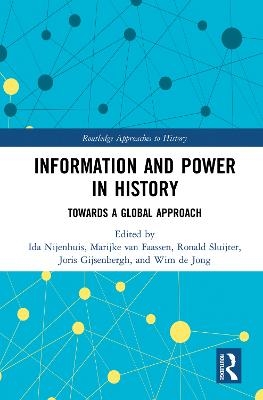
Information and Power in History
Routledge (Verlag)
978-1-138-34406-8 (ISBN)
The relationship between information and power is a relevant subject for all times. Today’s perceived ‘information revolution’ has caused information to become a separate object of study during the last two decades for several disciplines. As the contemporary perspective is dominant, information history as a discipline of its own has not yet crystallized. In bringing together studies around a new research agenda on the relationship between information and power across time and space, presenting various governance regimes, media, materials, and modes of communication, this book forces us to rethink the prospects and challenges for such a new discipline.
Ida Nijenhuis is senior researcher at the Department of History at the Huygens Institute for the History of the Netherlands, the Netherlands Marijke van Faassen is senior researcher at the Department of History at the Huygens Institute for the History of the Netherlands, the Netherlands Ronald Sluijter is researcher at the Department of Digital Data Management at the Huygens Institute for the History of the Netherlands, the Netherlands Joris Gijsenbergh is assistant professor in Political History at Radboud University Nijmegen, the Netherlands Wim de Jong is postdoctoral researcher at the Open University, the Netherlands
1. The potency of the human element: information and power in history; 2. Period, theme, event: locating information history in history; Theme I: Experts and influence; 3. Knowledge is power. Opening up the teaching monopoly on the art of rulership in medieval Italy; 4. Trading information. Willem Usselincx (1567-1647) in the corridors of power; 5. Electoral research, pollsters and the performative power of information about the ‘public’. The Netherlands and the transatlantic connection (1945-1990); 6. From neo-corporatism to regulatory governance: interests, expertise and power in Dutch extraparliamentary governance, c. 1900-2018; Theme II: Exchange and hegemony; 7. The perils of the post road: diplomats, diplomatic couriers, and the informational fabric of early modern Europe; 8. Communication, information and power in the Dutch colonial empire: The case of the Dutch East India Company, c. 1760; 9. Unifying the country: information-gathering by the Dutch central government in the Batavian-French period (1795-1813); Theme III: Disclosure and control; 10. Sailing and secrecy. Information control and power in Dutch overseas companies in the late sixteenth - early seventeenth century; 11. Struggling for the ‘right to know’. American and British attitudes towards whistle-blowers (1966-2005); 12. An optimizer of power? The political usefulness of Dutch security intelligence, 1966-1989; 13. The power struggle between the party and the public library. The crisis of public librarianship in communist Romania (1970-1989); Theme IV: Empowerment and neglect; 14. Contested law-making: mobilization for the right to information law in India, 1990-2005; 15. Carved in stone? The role of written and unwritten information in solving the Eurasian question after 1945; 16. Paper trails to private lives. The performative power of card indexes through time and space; 17. Information and power in history: a new historiographical approach?
| Erscheinungsdatum | 08.04.2019 |
|---|---|
| Reihe/Serie | Routledge Approaches to History |
| Zusatzinfo | 3 Tables, black and white; 10 Line drawings, black and white; 3 Halftones, black and white; 13 Illustrations, black and white |
| Verlagsort | London |
| Sprache | englisch |
| Maße | 156 x 234 mm |
| Gewicht | 453 g |
| Themenwelt | Geschichte ► Allgemeine Geschichte ► Neuzeit (bis 1918) |
| Geisteswissenschaften ► Geschichte ► Geschichtstheorie / Historik | |
| Geschichte ► Teilgebiete der Geschichte ► Militärgeschichte | |
| ISBN-10 | 1-138-34406-0 / 1138344060 |
| ISBN-13 | 978-1-138-34406-8 / 9781138344068 |
| Zustand | Neuware |
| Haben Sie eine Frage zum Produkt? |
aus dem Bereich


